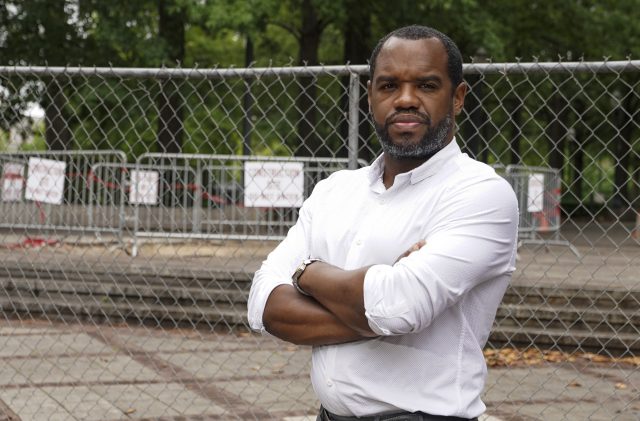
By Barnett Wright
The Birmingham Times
The outrage over the death of George Floyd —a black man killed by police in Minneapolis—has already led to change in Birmingham, said former City Council President Johnathan Austin.
Austin, now a public interest and personal injury attorney in Birmingham, said the removal of the Confederate Soldiers and Sailors Monument from Linn Park in downtown – which he called “one of those symbols of racial inequality and injustice” — may not have happened without Floyd’s horrific death.
“I believe that the death of Mr. George Floyd, and those 8 minutes, 46 seconds (the police officer knelt on Floyd’s neck) . . . caused us to take a look at ourselves as a country and decide that enough is enough,” Austin said.
The attorney said he hopes the history books will reflect that people in Birmingham finally got tired “of walking by that statue every day.”
In 2017, while president of the City Council, Austin went to Montgomery to oppose a bill, the Confederate Memorial Preservation Act, by the state legislature that would have allowed the state to prohibit and prevent cities from removing confederate statues.
‘“I went [to the Legislature] representing the City Council and told them we were opposed to that bill because there were things that we would like to do in our own city, particularly Birmingham,” Austin recalled. “When you’re in a city in the South, particularly Alabama, the [state’s] 1901 Constitution made sure that power would always be consolidated in the state capital, from Montgomery, by the elected representatives of the state.”’
‘“They ensured that they would have that right [by passing a bill in 2017], to prevent the City of Birmingham and any other city across the State of Alabama from removing a federal monument.”
Instead, the Legislature put in place a one-time $25,000 fine.
At City Hall, Austin began discussions during committee and council meetings and went before the Parks and Recreation board, which voted unanimously to have that monument removed from Linn Park.
Austin pressed the issue arguing the monument was “causing too much pain, too much grief, too much division in our community, and the best thing to do would be to remove it from our park and give it to [a city or county] who wants it,” he said in an interview with The Times.
He held a press conference over an issue that many local cities have had for years: home rule — the ability for local municipalities to govern and regulate themselves.
“When you have local elected officials…those individuals have a responsibility to regulate and represent the city that they were elected to serve and they know best, and what the needs and the census are.”
Mayor William Bell responded by erecting a plywood barrier around the monument.
Austin said he was in favor of removing the statue and paying the fine. “Quite frankly, the fine and the cost to remove it is less than what the City Council spends on lunch for a gathering, [during] the Magic City Classic, and we’re not even talking about a party, just a lunch,” he said.
Austin said it was “unfortunate” at the way the protests evolved around the removal “but fortunately, this time we had a mayor who was willing to stand with the City of Birmingham.”
“Every other mayor before Mayor Woodfin had the authority to remove that statue without any fines, or penalties and without a lot of fanfare, . . .” Austin said, “ . . . it took this young man that we have as our current mayor to take that necessary step to address something that has been so painful to so many people in our community.”
“Everyone should be grateful that we have Randall Woodfin as our mayor because he took action when every other mayor before him had the opportunity with no consequence and they still didn’t do it.
“And it forced our local leaders to address it and fortunately we have one that was bold enough, and courageous enough to do what he thought was best for the people that he was elected to represent.”
Getting the statue removed is a step in the right direction given what black people face, as evidenced by the past two weeks, Austin said.
“I have a black son that I’ve got to worry about . . . in this country when he gets older if things don’t change. I’ve got to do my part to make sure that he has the best life I can give him and that he’s protected and safe. I’m going to continue to do what I can to make sure he has a better chance, and that he understands what’s going on in this world, and that the odds are against him.”
Times freelancer Je’Don Holloway Talley contributed to this report.



